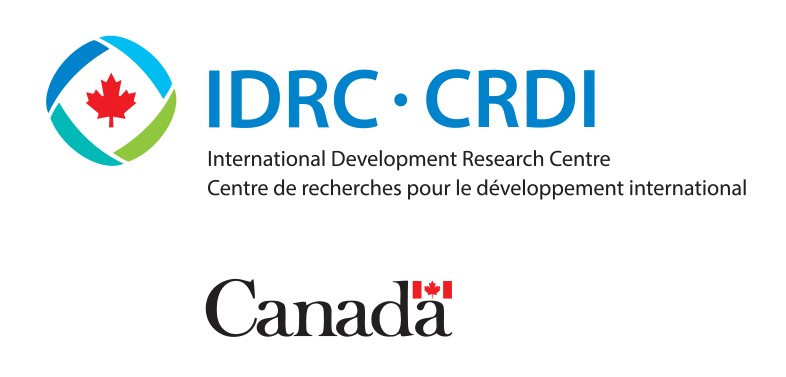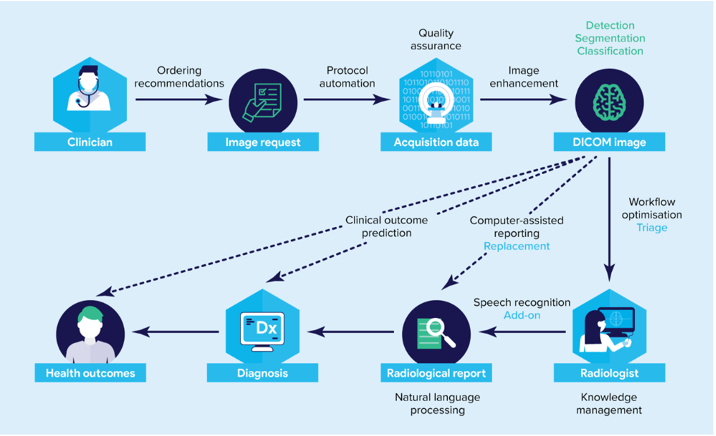AI for Healthcare in Morocco: Advances and Challenges


Artificial Intelligence (AI) has been identified as a game changer in the healthcare industry around the world, including Morocco. In recent years, Morocco has seen a growing adoption of AI technology in healthcare, with both the private and public sectors making significant progress. It is becoming one of the most critical, high-value industries in the world. Therefore, it should come as no surprise that a lot of money is being spent on creating solutions that allow for a better experience for both patients and caretakers. In order to accomplish this, AI has emerged as a promising technology that is already having an effect across many facets of healthcare. However, there are still some issues with quality when it comes to AI applications in healthcare and how they can be improved over time by everyone involved.
Radiological imaging, the main use of AI in Morocco:

“In Morocco, artificial intelligence is already used in the health sector, but at different levels.”
Medical imaging is one of the fields in which AI is being used in Moroccan healthcare. Private healthcare facilities like Clinique Dar Salam in Casablanca have implemented AI-powered medical imaging platforms to Figure 1. Role of radiology AI software in the clinical radiology workflow.
increase diagnostic accuracy and shorten diagnosis times. For instance, Clinique Dar Salam's AI-powered medical imaging platform has decreased the time needed to diagnose breast cancer from 20 minutes to just 3 minutes, improving patient outcomes.
In addition to medical imaging, AI is also being applied in other areas of healthcare in Morocco.
For example, the Moroccan Ministry of Health has partnered with IBM to develop an AI-powered platform that can help detect and diagnose breast cancer, particularly in remote areas where there are no specialized healthcare providers. The platform uses AI algorithms to analyze mammogram images and identify areas that require further examination.
The efficiency of healthcare services in Morocco, especially in the public sector, could be greatly increased by the implementation of AI technology. Morocco suffers from a shortage of medical professionals, especially in rural areas, which has led to protracted patient wait times. The use of AI technology can help solve this issue by making it possible for medical professionals to diagnose and treat patients more effectively and swiftly.
AI can be used to enhance healthcare quality in the following ways:
- Improving data quality - for example, by identifying errors or inconsistencies in patient record data.
- Improving patient engagement - for example, by developing apps that assist patients in managing their own health and staying informed about what is going on with them.
- Providing clinical decision support - for example, recommending treatment options based on the patient's medical background or prior symptoms, before their current visit with the doctor.
The adoption of AI technology in healthcare in Morocco is also expected to have a positive impact on the economy. According to a report by the Moroccan Ministry of Industry, Trade, and the Green and Digital Economy, the adoption of AI technology in healthcare has the potential to create new jobs and attract foreign investment. While the private sector has been leading the way in the adoption of AI technology in healthcare in Morocco, the public sector has also been making significant progress. The Moroccan Ministry of Health has launched several initiatives to promote the use of AI in healthcare, including the development of the AI-powered platform for detecting and diagnosing breast cancer.
Start-Up Boost:
Given the public dissatisfaction with the quality of health systems in Morocco and across Africa, startups can make health services better and cheaper.
There are several startups in Morocco that are working on AI for healthcare. Here are a few examples:
- DEEPECHO, building an AI product developed by doctors and AI scientists & aiming at reinforcing antenatal diagnosis.
- DataPathology, develops and markets digital solutions to help its customers deliver pathological diagnosis remotely and in a faster and safer way.
- DabaDoc, working on an AI-powered platform that can connect patients with healthcare providers remotely. The platform uses AI algorithms to analyze patient data and provide recommendations to healthcare providers.
Several startups in Morocco are currently working on AI solutions for the healthcare industry. These companies are just a few examples of the growing trend towards the adoption of AI technology in healthcare throughout Morocco and other African countries. As this trend continues, it is anticipated that the use of AI in healthcare will result in better patient outcomes and more efficient healthcare services.
Top Most Common Challenges of AI in Healthcare:
The use of artificial intelligence (AI) in healthcare has the potential to revolutionize the healthcare industry in Morocco. However, there are several challenges that need to be addressed in order to fully realize the benefits of AI in healthcare.
- Lack of standard medical data:
One of the main challenges is the lack of adequate data infrastructure. Effective AI algorithms require large amounts of high-quality data. Unfortunately, the healthcare system in Morocco is fragmented and there is a lack of standardization in data collection and management. This makes it difficult to access and analyze data for AI development. To overcome this challenge, Morocco needs to invest in data infrastructure and create standardized systems for data collection and management.
- Lack of Regulatory Frameworks for AI in Healthcare:
 Another challenge is the lack of regulatory frameworks for AI in healthcare. Clear guidelines and
Another challenge is the lack of regulatory frameworks for AI in healthcare. Clear guidelines and
regulations are needed for the development and use of AI algorithms in healthcare to ensure patient safety and privacy. To address this challenge, regulatory bodies in Morocco should collaborate with healthcare providers, researchers, and technology companies to develop comprehensive frameworks for the development and use of AI in healthcare.
- Lack of Trained Personnel in AI in Healthcare:
A third challenge is the limited availability of trained personnel with expertise in AI and healthcare. Morocco needs to develop specialized training programs for healthcare professionals to enhance their knowledge and skills in AI and healthcare. Additionally, attracting and retaining talented individuals with expertise in AI to the healthcare industry in Morocco is essential.
Overcoming Challenges in AI-Driven Healthcare:
“Collaborative Approaches for Innovative Solutions in Morocco”
To overcome these challenges, several approaches can be taken:
- Encouraging collaboration between healthcare providers, researchers, and technology companies can lead to the development of innovative solutions that can improve patient outcomes and increase the efficiency of healthcare services.
- Investing in research and development of AI algorithms specifically tailored to the healthcare system in Morocco is also important.
- Moreover, promoting public-private partnerships to invest in data infrastructure and develop regulatory frameworks can support the safe and effective use of AI in healthcare.
By investing in data infrastructure, developing regulatory frameworks, and enhancing the expertise of healthcare professionals, Morocco can overcome these challenges and become a leader in AI-driven healthcare in Africa.
Conclusion:
AI is increasingly used in healthcare in Morocco, offering benefits such as improved patient outcomes and increased efficiency, particularly in remote areas. Despite challenges like data privacy and skilled professionals, Morocco is overcoming them through data standardization, robust regulations, and education for healthcare professionals. The future of AI in healthcare in Morocco and Africa is promising and will continue to transform healthcare services.

Written by : Oussama SEFRIOUI
Entrepreneur and Experienced IT professional with a passion for Information technology and Infrastructure implementation and security, and Cloud computing. Working with different industries from Banks to Distribution and services, to deliver and ensure the highest standards of IT security and efficiency. With 20+ years of experience in the IT field, he was able to implement several high value projects for key customers in Morocco and abroad.
Experienced in project management and outsourcings services, Helping businesses reach their goals and full potential with innovative, preformant and secured IT solutions.
General Manager of AGO IT Solutions Africa. since 2014 to bring innovative solutions for organizations.
Global citizen and life-long learner, he holds an MBA from ENPC, France since 2012, and BSc in Computer Networks from Al Akhawayn University, in Morocco, Class of 2002.

